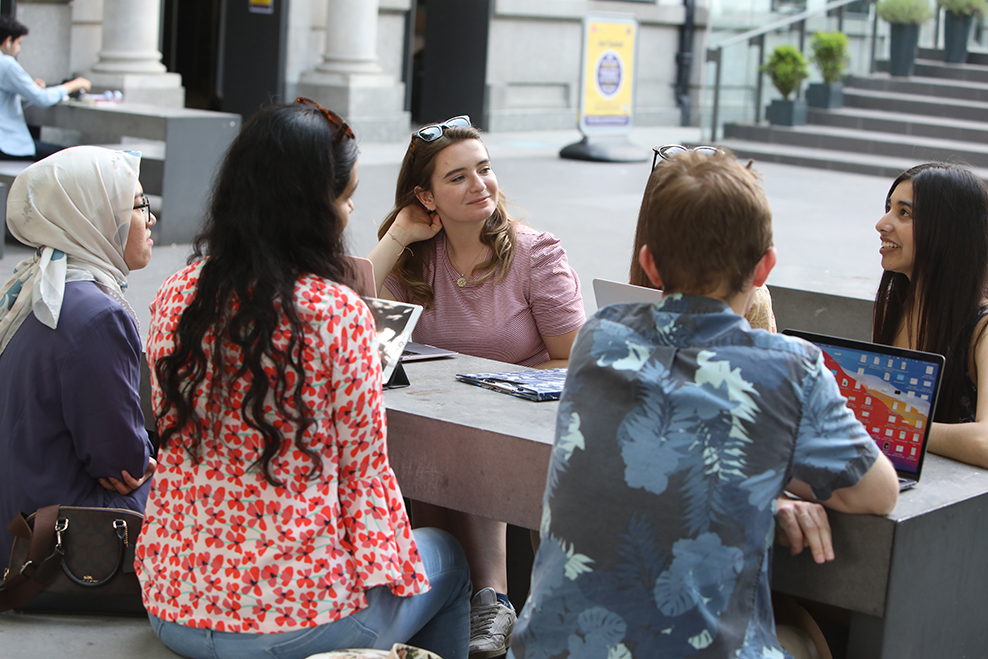At our PhD panel in November 2021, we heard from speakers now working in four career sectors – the UK public sector, academia, consultancy and an international organisation. Their different trajectories reveal experiences of career development which will interest anyone laying the foundations of post PhD progression.
In our ‘PhD Journeys’ series, we focus on the experiences of each of the panellists – this blog explores the career trajectory of Anne Irfan…
Anne is an academic at University College London, after a number of fixed-term positions at the Universities of Sussex and Oxford.
She is delighted to have secured a permanent academic job at Russell Group University.
The two fixed-term jobs, prior to her current position, built skills and experience and made Anne a strong candidate when she applied for this permanent post. The first job was a Teaching Fellowship at the University of Sussex which she accepted during the last year of her PhD and involved covering for a more senior academic who was on leave. This was a very intense position, teaching three modules, which built lots of teaching experience for her CV and future academic applications. Anne suggests you don’t dismiss teaching experience; it will not be a determining factor at selection stage but strengthens applications significantly and can be critical in building your confidence.
Following this role, a summer of unemployment was stressful for Anne, but then she was offered a two-year lectureship at the University of Oxford on a fixed-term teaching and research contract. A successful British Academy application for a research grant meant Anne could also concentrate on writing and publishing. She encourages you to apply for different funding routes as well as the scary and highly competitive ‘official’ post-doc positions. There are many ways to fund your work in academia in addition to the prestigious, competitive postdocs, known at Oxford and Cambridge as Junior Research Associates (JRAs). Anne’s contract at Oxford was extended to three years but she ended up leaving early upon securing her permanent post at UCL.
Value your diversity
Identifying and valuing the diversity in your background means that you can transfer your areas of expertise across a range of departments and specialisms. For Anne, this includes international history, Palestinian refugee history, migration, politics and broader social science and humanities combinations. Transferability of areas of expertise has opened doors for Anne, and as UK academia moves towards embracing interdisciplinarity, carving out a niche with awareness of how to speak across disciplines can increase the ‘marketability’ of your research.
When writing academic job applications, Anne notes that they will be read by non-specialists as well as some specialists in your field, so phrase the descriptions of your work accordingly, thinking about “bigger questions” that research speaks to and why it matters. For academic careers it is good to finish your PhD on time – prioritise if necessary, be transparent about circumstances that might intervene and work with your supervisor on a schedule to stay on track with your PhD and be ready for your submission date. To be considered for academic jobs you may apply for before finishing your PhD, so it is vital to show clearly that you will finish on time.
Have a Plan B
Reflecting on her success, Anne suggests it is always good to have a Plan B for jobs outside academia, so you are ready if it doesn’t work out. She sees that positive change is happening in academia with impact work increasing in value and opening doors for alternative career pathways. Pitching yourself as someone who can speak to diverse audiences beyond the academy including media engagement and public speaking are valued. When applying for academic jobs, if you have the capacity for it (and don’t stress if not), it can be helpful to think about a second project or a project beyond the PhD while finishing up. This doesn’t need to be a fully developed proposal, but reasonably well thought through ideas will help you to pitch yourself as somebody with “future potential”. Ideally, this is a “bridge project” that grows out of your PhD into future directions.
Finally, Anne suggests making use of resources at LSE available via PhD Academy and LSE Careers; do full research into who is out there at LSE to offer help career wise and for managing your PhD.
With thanks to all our contributors to the PhD Journeys series – Astrid Hampe-Nathaniel, Jaskiran Kaur Bhogal, Jun Yu and Anne Irfan.
For more support with planning your next steps after your PhD, book an appointment with Catherine Reynolds.



